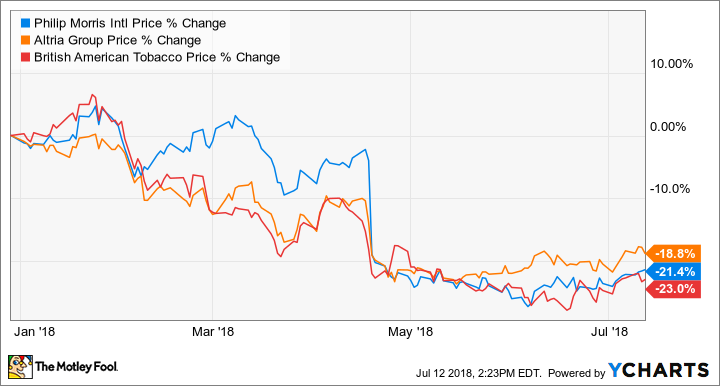Why Tobacco Stocks Have Lost Around 20% This Year
What happened
It's just past the halfway point of the year and tobacco stocks are broadly down. As of July 12, the world's three biggest tobacco companies have each given up about 20% this year: According to data from S&P; Global Market Intelligence, Altria (NYSE: MO), the U.S. seller of Marlboro, is down 18%; Philip Morris (NYSE: PM), the international distributor of Marlboro and other brands, has fallen 21%; and British American Tobacco (NYSE: BTI), which sells brands including Dunhill and Pall Mall, is down 22%.
As the chart below shows, all three stocks have followed roughly the same trajectory since the start of the year, as tobacco stocks tend to be influenced by the same factors. The industry is struggling with the global shift away from smoking cigarettes due to health concerns, while trying to successfully pivot to alternatives such as e-cigarettes. As a result, the once-reliable sector has suffered this year -- and its big three stocks got slammed across the board in April.
So what
The worst day of the year for tobacco stocks came on April 19 when Philip Morris issued a disappointing first-quarter earnings report, a bad omen for the industry on a number of fronts. The stock had its worst day in over a decade, falling 16%. Among the concerns was that the growth of iQos, the company's new heat-but-not-burn vape-like product, was slowing after initial success in Japan, a key market for Philip Morris. CFO Martin King said, "Device sales were slower than our ambitious expectations" after the company lifted a sales restriction. Notably, iQos is available in 38 markets, but not the U.S.

Image source: Getty Images.
Philip Morris's revenue of $6.9 billion also missed estimates of $7.03 billion. Altria shares sold off 6% on the news as well, as it has a research-sharing agreement with Philip Morris and could sell the iQOS in the U.S. if it were legalized. British American Tobacco, which also has big hopes for vaping, lost 5% the same day.
British American Tobacco, meanwhile, saw its shares slide 13% in February as it reported modest organic earnings growth in its fourth quarter report following its acquisition of Reynolds American the year before. Altria shares also slid through the first few months of the year in spite of respectable earnings growth and a surprise dividend hike thanks to the reduced U.S. corporate tax rate.
Now what
The industry-wide sell-off in response to Philip Morris' update on the iQOS shows how much tobacco investors are counting on a successful transition to smoke-free products like vapes and "heat-not-burn" devices to replace income from cigarettes. Despite selling a declining product, tobacco stocks fetch moderate P/E valuations -- around 16 -- bolstered by strong dividends.
In addition to generally declining cigarette sales, the concern about the transition to vaping is that a smaller competitor could beat the tobacco giants. This seems to be happening already with Juul, the fastest-growing e-cigarette maker in the U.S., which offers a product that has become synonymous with the activity itself -- "Juul" is often used as a verb to mean vape. In one four-week period last year, Juul saw sales spike 621%, and the company is now raising money at a $15 billion valuation. The best move for the tobacco giants may be to buy Juul, form a strategic partnership with it, or make a copycat product.
It's also possible that the slowdown in iQOS growth is just a blip on the radar, as this was just one single event in one country. Philip Morris also explained that the deceleration was in part because the company is focusing on converting an older clientele to new devices.
It's surprising to see such as solidly profitable industry sell off like this in just six months, but the investor response makes it clear that tobacco stocks may no longer be the safe bet that they have been for generations.
More From The Motley Fool
Jeremy Bowman has no position in any of the stocks mentioned. The Motley Fool has no position in any of the stocks mentioned. The Motley Fool has a disclosure policy.

 Yahoo Finance
Yahoo Finance 
